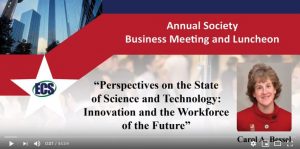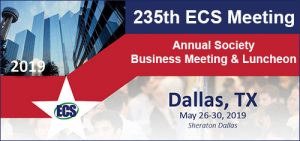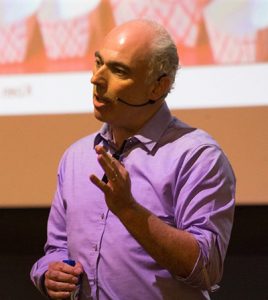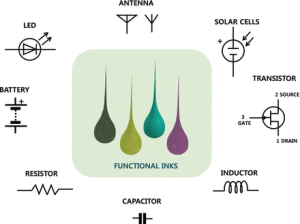 As ECS celebrates the 40-year-anniversary of its first female president, Joan Berkowitz, it is important to note that ECS has a tradition of showcasing women in the sciences at its meetings. Carol A. Bessel, acting division director at the National Science Foundation (NSF), was the highlighted speaker at the annual business meeting at the 235th ECS Meeting. Valerie Browning, director of the Defense Advances Research Projects Agency (DARPA)’s Defense Sciences Office (DSO), will deliver the ECS Lecture at the plenary session of the 236th ECS Meeting. If including, recognizing, and hearing women is critical to attracting and retaining talented women in the sciences, then Bessel and Browning are shining examples of women leading the way. (more…)
As ECS celebrates the 40-year-anniversary of its first female president, Joan Berkowitz, it is important to note that ECS has a tradition of showcasing women in the sciences at its meetings. Carol A. Bessel, acting division director at the National Science Foundation (NSF), was the highlighted speaker at the annual business meeting at the 235th ECS Meeting. Valerie Browning, director of the Defense Advances Research Projects Agency (DARPA)’s Defense Sciences Office (DSO), will deliver the ECS Lecture at the plenary session of the 236th ECS Meeting. If including, recognizing, and hearing women is critical to attracting and retaining talented women in the sciences, then Bessel and Browning are shining examples of women leading the way. (more…)
 If you are an ECS member—or considering joining— you may be curious about The Electrochemical Society’s activities. ECS makes a full report to its members once a year at the Annual Society Business Meeting and Luncheon (ASBM). Here, at the spring meeting, ECS reviews the successes and challenges of the past year and outlines plans for the upcoming year. Members are called on to vote on important business. New officers are introduced and the Society’s financial position presented. ASBM is an opportunity for attendees to ask questions, meet the Society’s leadership, and hear a leading authority deliver an important address. However, not everyone can attend the ASBM. To satisfy your curiosity, you can watch the video of the proceedings and learn how active participation in ECS benefits its members greatly – and being informed is an important part of that. (more…)
If you are an ECS member—or considering joining— you may be curious about The Electrochemical Society’s activities. ECS makes a full report to its members once a year at the Annual Society Business Meeting and Luncheon (ASBM). Here, at the spring meeting, ECS reviews the successes and challenges of the past year and outlines plans for the upcoming year. Members are called on to vote on important business. New officers are introduced and the Society’s financial position presented. ASBM is an opportunity for attendees to ask questions, meet the Society’s leadership, and hear a leading authority deliver an important address. However, not everyone can attend the ASBM. To satisfy your curiosity, you can watch the video of the proceedings and learn how active participation in ECS benefits its members greatly – and being informed is an important part of that. (more…)
 What do Koen Kas and Valerie Browning have in common? They were both chosen to deliver The Electrochemical Society (ECS) Lecture at meeting plenary sessions. ECS selects only the most prestigious and forward thinking specialists to present these lectures. Koen Kas delivered the ECS Lecture at the 235th ECS Meeting. Valerie Browning will present the ECS Lecture at the 236th ECS Meeting. Plenary session attendees get to meet the speakers. So be sure to mark your calendar for Browning’s presentation in October at the plenary session of the ECS Meeting.
What do Koen Kas and Valerie Browning have in common? They were both chosen to deliver The Electrochemical Society (ECS) Lecture at meeting plenary sessions. ECS selects only the most prestigious and forward thinking specialists to present these lectures. Koen Kas delivered the ECS Lecture at the 235th ECS Meeting. Valerie Browning will present the ECS Lecture at the 236th ECS Meeting. Plenary session attendees get to meet the speakers. So be sure to mark your calendar for Browning’s presentation in October at the plenary session of the ECS Meeting.
The ECS Lecture presenters speak on topics that are important for electrochemical and solid state scientists. Koen Kas is a lifetime member of ECS. A renaissance man, Kas is known as a healthcare futurist, entrepreneur, professor of molecular oncology, acclaimed international keynote speaker, and author.
The following is a roundup of the most watched videos on ECS’s YouTube channel in 2017.
1. Your donation can Free the Science
ECS’s Free the Science initiative aims to move toward a future that embraces open science. Learn how you can help support this long-term vision for transformative change in the traditional models of communicating scholarly research.
Nobel laureate and climate advocate Al Gore is optimistic about climate change in his new TED Talk. In his talk, Gore proposes three questions — the answers of which help make the case for optimism on climate change.
While society as a whole is moving toward cleaner, more renewable energy sources, there is one key component that is typically glossed over in the energy technology conversation: energy storage.
Developments in solar and wind are critical in the battle against climate change, but without advances in energy storage, our efforts may fall short. What happens when the sun isn’t shining or the wind isn’t blowing?
The folks at Popular Science are providing a friendly analogy to explain the the importance of energy storage.
Logan Streu, ECS Content Associate & Assistant to the CCO, recently came across a video that takes a close (albeit funny) look at the misleading or misused words frequently used in scientific research.
Is “scientific proof” an oxymoron? Is there really a gene for everything? Check out the video below to see some of the phrases that are often misused.
Want more science videos? Check out our YouTube channel!
Actress, comedian, and author Amy Poehler has put a lot of effort into empowering young girls in science for some time now. Her Smart Girls project took off in 2008, which serves as a place where future women can foster their curiosity and pursue opportunities in STEM. Now Poehler and her Smart Girls group are adding to the women in STEM conversation with their new series, “Experimenting with Megan Amram.”
Amram is a Harvard graduate, author, and comedian. The new web series serves as a perfect platform to continue what she already started in her book Science… for Her!. The parody science text is comedic in nature, but takes a hard look at the gender gap in STEM and offers up some pretty solid science as well.
As an added bonus, you can even get a step-by-step instructions on how to conduct Amram’s experiments.
PS: Head over to the ECS YouTube page to find more educational science videos.
“I took to electrochemistry like a fish to water.” -Allen J. Bard
Regarded by many as the “father of modern electrochemistry,” Bard is best known for his work developing the scanning electrochemical microscope, co-discovering electrochemiluminescence, contributing to photoelectrochemistry of semiconductor electrodes, and co-authoring a seminal textbook in the field of electrochemistry.
You can also listen to Bard’s interview as an audio podcast.
Find the rest of the ECS Masters series on YouTube.
Printable Functional Materials for Electronics and Energy Applications (Videos)
Posted on July 14, 2015 by ECSThe videos and information in this post relate to an ECS Journal of Solid State Science and Technology focus issue called: Printable Functional Materials for Electronics and Energy Applications.
(Read/download the focus issue now. It’s entirely free.)
Printing technologies in an atmospheric environment offer the potential for low-cost and materials-efficient alternatives for manufacturing electronics and energy devices such as luminescent displays, thin-film transistors, sensors, thin-film photovoltaics, fuel cells, capacitors, and batteries. Significant progress has been made in the area of printable functional organic and inorganic materials including conductors, semiconductors, and dielectric and luminescent materials.
These new printable functional materials have and will continue to enable exciting advances in printed electronics and energy devices. Some examples are printed amorphous oxide semiconductors, organic conductors and semiconductors, inorganic semiconductor nanomaterials, silicon, chalcogenide semiconductors, ceramics, metals, intercalation compounds, and carbon-based materials.
A special focus issue of the ECS Journal of Solid State Science and Technology was created about the publication of state-of-the-art efforts that address a variety of approaches to printable functional materials and device. This focus issue, consisting of a total of 15 papers, includes both invited and contributed papers reflecting recent achievements in printable functional materials and devices.
The topics of these papers span several key ECS technical areas, including batteries, sensors, fuel cells, carbon nanostructures and devices, electronic and photonic devices, and display materials, devices, and processing. The overall collection of this focus issue covers an impressive scope from fundamental science and engineering of printing process, ink chemistry and ink conversion processes, printed devices, and characterizations to the future outlook for printable functional materials and devices.
The video below demonstrates Printed Metal Oxide Thin-Film Transistors by J. Gorecki, K. Eyerly, C.-H. Choi, and C.-H. Chang, School of Chemical, Biological and Environmental Engineering, Oregon State University.
Step-by-step explanation of the video:


